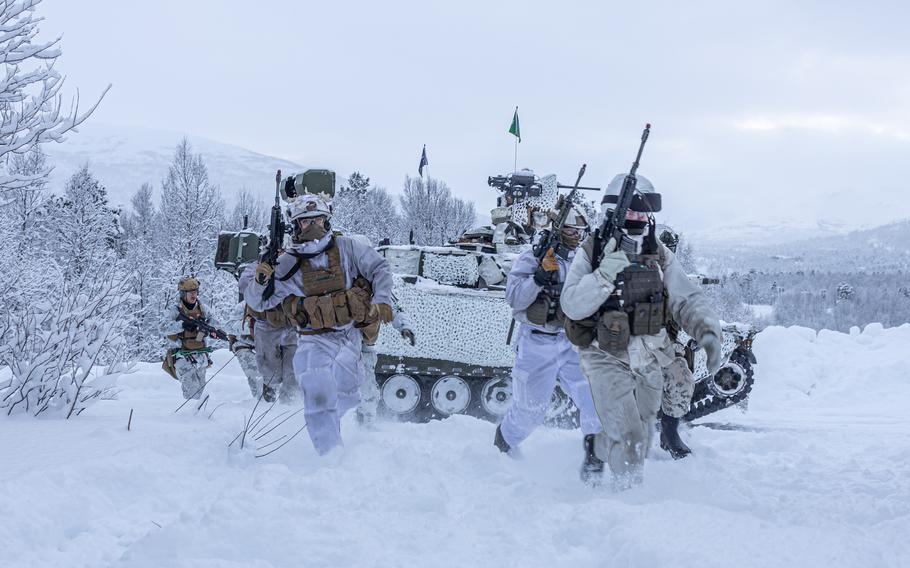
U.S. Marines and their allies conduct a breaching and clearing mission in Setermoen, Norway, Feb. 7, 2024, in preparation for Nordic Response. (Christian Salazar/U.S. Marine Corps)
STUTTGART, Germany — U.S. Marines are bringing their expertise in littoral operations to the High North, where thousands of troops are practicing tactics that would come into play in a crisis, the service’s top general in Europe said Wednesday.
The Marine Corps is leading Nordic Response, one of NATO’s largest military drills this year. The two-week exercise, which began Sunday, involves 20,000 troops fanned out across Norway, Sweden and Finland.
The exercise will serve as a testing ground over the next two weeks as U.S. and allied forces tinker with tactics so they can fight seamlessly against a “capable opponent,” said Maj. Gen. Robert Sofge, commander of the Stuttgart-based Marine Corps Forces Europe and Africa.
While Sofge did not single out Russia, Nordic Response is organized around defending allies from a potential attack from the east.
Various other exercises now unfolding in other parts of Europe, collectively referred to as NATO’s Steadfast Defender series, also are focused on countering Russia.
U.S. Marines have a long history of operating in Norway and would be tasked with fighting alongside allies as a combined force should northern Europe come under attack, Sofge said, adding that they “would work hard in the littoral regions.”
Nordic Response involves 2,500 Marines and brings together alliance warships and fighter planes.
The II Marine Expeditionary Force is serving as the land component headquarters for Nordic Response, operating out of Bardufoss Air Station in Norway.
In addition to ground troops, the Marines also have dispatched fighter pilots, who will fly the fifth-generation F-35B Lightning II and F/A-18 Hornets.
“Nordic Response stresses that now is the time to get our systems connected ... to ensure we can sense and make sense in a complex battlefield in the harshest of conditions against a capable opponent,” Sofge said.
Nordic Response has a new twist this year. Finland is taking part as a NATO member for the first time, having joined the alliance last year in the wake of Russia’s 2022 invasion of Ukraine, which prompted a reversal of decades of Finnish neutrality.
Sweden joined Finland’s accession bid but was stonewalled for two years by Turkey and Hungary. It is likely to be officially declared the alliance’s 32nd member during the exercise. Sweden’s flag could be raised at NATO headquarters in Brussels any day now, symbolizing the country’s standing.
The additions will give NATO two experienced militaries that are well-trained for operating in harsh Arctic conditions, Sofge said.
“NATO was strong before and it’s stronger now,” he said. “It’s better. ... That’s what I think has practically changed.”